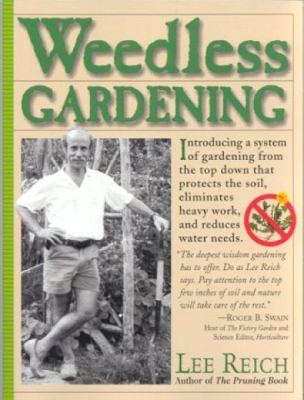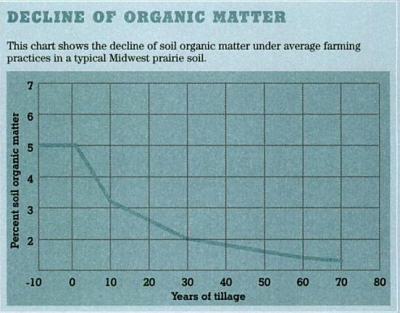
Weedless Gardening
 Weedless Gardening
by Lee Reich is another one of those books that made me say, "If only
I'd read this two years ago, I wouldn't have had to read a dozen
books and try out half a dozen methods on the ground to learn that
stuff!" Then I remembered how much I love to read and experiment,
and am glad I saved Lee Reich's book for a day when it would help me
streamline my operation rather than giving me a template to copy.
Weedless Gardening
by Lee Reich is another one of those books that made me say, "If only
I'd read this two years ago, I wouldn't have had to read a dozen
books and try out half a dozen methods on the ground to learn that
stuff!" Then I remembered how much I love to read and experiment,
and am glad I saved Lee Reich's book for a day when it would help me
streamline my operation rather than giving me a template to copy.
Lee Reich sums up his
gardening method with four simple factors
- Minimize soil disruption --- Don't till or dig.
- Protect the soil surface --- Keep a constant mulch or crop cover.
- Avoid soil compaction --- Walk on designated paths
- Use drip irrigation
Although our garden
operates better with pulsating
sprinklers
than with drip irrigation, I'm completely in favor of Lee Reich's other
three points. As he explains, keeping the soil surface mulched
and
the soil structure intact has a heaping handful of benefits, including:
- Fewer weeds --- Tilling exposes seeds below the surface to light and air, which tempts them to sprout. If you don't till and do keep the soil surface mulched, the seedbank of weeds that is inevitably found in all soil will sit in a dormant state and leave you alone.
- More moisture --- When you till, you disrupt the structure of the soil, which makes it harder for water to move up and sideways by capillary action. As a result, you have to water often or keep the roots of your plants dipping into the groundwater to prevent your crops from wilting. No-till soil develops channels that pull water up from below to hydrate your plants.
- Earlier spring planting --- It's tough to put in a spring garden if you have to wait until the ground is dry enough to till. With a no-till garden, you can plant as early as you want.
- Protection from erosion and crusting --- Heavy rain pounding into bare soil is bad news. If the water doesn't carry your precious topsoil away, it will break up the soil particles and form a crust on the surface that prevents future rain from infiltrating. A heavy mulch protects the soil surface from the problematic effects of heavy rain, as well as mitigating summer temperatures, slowing evaporation, and allowing more water to soak into the surface without running off.
 More organic matter ---
One of the best parts of the book is this amazing graph which shows how
the organic matter in prairie soil stayed steady at 5% until the land
was plowed. During the first decade of conventional farming, the
soil lost 40% of its organic matter, and by the third decade it had
lost another 20%. When you till soil, extra air comes in contact
with soil particles and sends the decomposing microorganisms into a
flurry of activity. They break down the organic matter quickly,
with the advantage that some instantly available nutrients are produced
for that year's crops. However, most of the nutrients in the
organic matter are burned too quickly and turn into gases that leave
the soil forever. We all know that organic matter is key to good
soil, so any method that burns through 40% of your soil's organic
matter in a decade is bad news.
More organic matter ---
One of the best parts of the book is this amazing graph which shows how
the organic matter in prairie soil stayed steady at 5% until the land
was plowed. During the first decade of conventional farming, the
soil lost 40% of its organic matter, and by the third decade it had
lost another 20%. When you till soil, extra air comes in contact
with soil particles and sends the decomposing microorganisms into a
flurry of activity. They break down the organic matter quickly,
with the advantage that some instantly available nutrients are produced
for that year's crops. However, most of the nutrients in the
organic matter are burned too quickly and turn into gases that leave
the soil forever. We all know that organic matter is key to good
soil, so any method that burns through 40% of your soil's organic
matter in a decade is bad news.
I assume you're all
completely sold by now on Lee Reich's weedless
gardening method, so I'll spend the rest of this lunchtime series
getting down to the nitty gritty.
| This post is part of our Lee Reich's Weedless Gardening lunchtime
series.
Read all of the entries: |
Want more in-depth information? Browse through our books.
Or explore more posts by date or by subject.
About us: Anna Hess and Mark Hamilton spent over a decade living self-sufficiently in the mountains of Virginia before moving north to start over from scratch in the foothills of Ohio. They've experimented with permaculture, no-till gardening, trailersteading, home-based microbusinesses and much more, writing about their adventures in both blogs and books.
Want to be notified when new comments are posted on this page? Click on the RSS button after you add a comment to subscribe to the comment feed, or simply check the box beside "email replies to me" while writing your comment.

extra air comes in contact with soil particles and sends the decomposing microorganisms into a flurry of activity. They break down the organic matter quickly, with the advantage that some instantly available nutrients are produced for that year's crops. However, most of the nutrients in the organic matter are burned too quickly and turn into gases that leave the soil forever.
i hadn't heard it put quite like that before...modern agriculture...just another one of humanity's forays into "efficicency" from which we must beat a hasty retreat. we got our work cut out for us in the 21st century.